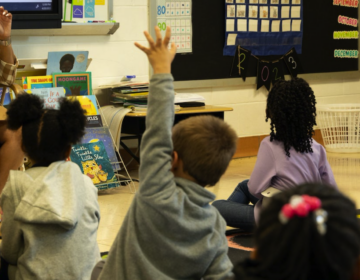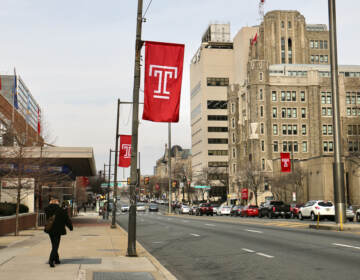Penn students compete to offer big ideas
University of Pennsylvania students competed Sunday night to offer the most compelling ideas for improving Philadelphia.
Some of the ideas presented were bigger than others. The winning student team made a proposal called “Closing Schools, Opening Opportunities.” It addressed the Philadelphia school district’s need to close a nubmer of school buildings to save money and avoid unused space.
The student teams made presentations to a panel of judges in an event at WHYY.
Sarah Besnoff, a law student, explains that her team suggested selling off the most marketable buildings first to pay for redevelopment of the remaining hard cases, which might otherwise sit for a long time.
“We don’t want these to just be sold for as low a value as they can possible get,” she said. “We want them to be sold through thoughtful stewardship, and we also want to make sure the necessary things for the safety and the security of the buildings happens.”
That would be present challenges for a district strapped for cash. But Besnoff’s team – which included former law student Aaron Tjoa and architecture students Evan Litvin and Lea Oxenhandler – argued that their idea would save money in the long run.
By deeding the properties to the Philadelphia Redevelopment Authority, they said, the district will save will save costs of ongoing maintainance of the properties.
As one judge put it, the argument was that the school district should stick to education and let somebody else with more experience at real estate handle the buildings.
For proposing the winning strategy, the team won $10,000 and the right to move onto a national competition on April 22 at the National Constitution Center.
The contest was organized by the Fels Institute of Government. Fels assembled a panel of judges with lots of real-world experience in government and policy.
One judge, Philadelphia Councilwoman Marian Tasco, explained why the panel liked the schools proposal:
“I think the complexity of it shows their strength and a commitment to an idea that may be difficult. That is important when you’re competing nationally.”
Some of the other teams still hope to make a go of realizing their proposals for the region.
Several teams pointed to examples in other cities to make the case for the feasibility of ideas the city has been reluctant to adopt, including a bike share program. One proposal called for the creation of a pilot program of what’s called a medical home model, providing intensive support to low-income patients at high risk for hospitalization.
A similar program is in place in Camden.
WHYY is your source for fact-based, in-depth journalism and information. As a nonprofit organization, we rely on financial support from readers like you. Please give today.














